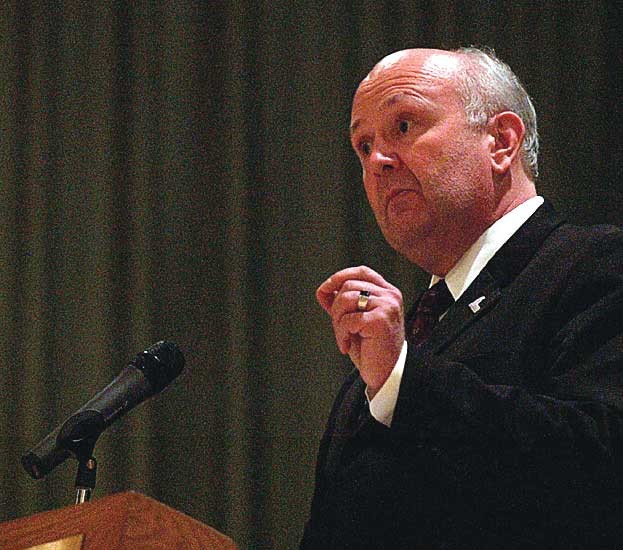BYU Professor: Future of Gay Marriage Should Be Up to the People
Dr. Richard Wilkins addressed legal implications of
recent court cases to mixed audience reaction Tuesday night
The
Daily Barometer, February 23, 2005
By Eric Dodson, staff writer
campus@dailybarometer.com,
737-2232
 In
Sunday’s episode of “The Simpsons,” Marge Simpson came to terms with her
sister’s gay marriage. Marge came to the conclusion that it didn’t matter
if people fit the traditional marriage criteria, as long as they cared for
each other.
In
Sunday’s episode of “The Simpsons,” Marge Simpson came to terms with her
sister’s gay marriage. Marge came to the conclusion that it didn’t matter
if people fit the traditional marriage criteria, as long as they cared for
each other.
According to Brigham Young University law professor
Richard Wilkins, “Marge may be right, considering the current legal
rules.”
In his lecture Tuesday night in the MU Ballroom, Wilkins
addressed the question of who should define those rules in the midst of
ongoing debates and court cases.
Wilkins is the director of the World Family Policy center
in Provo, Utah and has commented on the legal status of traditional families
throughout the world.
The event was sponsored by the Latter Day Saints Student Association and
OSU Convocations and Lectures.
The lecture was intended to “start a healthy
dialogue” according to Heather Benét, President of the LDSSA and a senior
in English.
“It’s not about whether gay marriage is good or bad
but how it should be decided—through courts or by the people,” she said.
In his lecture, Wilkins stressed the problems of deciding
the definition of marriage in court, drawing from his knowledge of
constitutional law.
“The framers of the constitution did not anticipate a
country ruled by judges,” he said. Speaking about the specific issue of gay
marriage, he asked, “Is it wise to allow the votes of five fallible human
beings to decide?”
Wilkins analyzed the constitutional interpretation that
led up to the U.S. Supreme Court’s ruling in Lawrence v. Texas in June 2003.
In that ruling, the court struck down Texas’ anti-sodomy laws.
Wilkins did not disagree with the outcome of the decision
but the ruling’s use of the constitution. In the ruling, Justice Kennedy
found that the moral basis of the sodomy legislation conflicted with his
interpretation of the 14th Amendment.
Wilkins disagreed, stating government regulations, by
definition, require a moral stance. He then spoke on the moral basis of
“traditional marriage” throughout history.
“An increasing amount of Americans understand marriage
is much more than just being in love,” he said. Wilkins stated he is in
favor of a constitutional amendment defining marriage as between one man and
one woman.
Some of Wilkins’ remarks stirred up a few audience
members, including one man who shouted “Bullshit!” and argued that
Wilkins’ definition of marriage was arbitrary. Another audience member held
up a sign that read “Equal-Status/Full Humanity” for the majority of the
lecture.
Christian Matheis, OSU LGBT program adviser, was glad
that the LDSSA was working to create discussion on campus.
“Having someone like Wilkins here is important because
it’s a chance for dialogue—assuming there’s no hate speech,” Matheis
said. However, Matheis expressed concern that LDSSA did not contact any
student groups representing other viewpoints. Those viewpoints are crucial to
the future of the gay marriage debate.
“Once you alienate someone based on arbitrary
criteria—secular or religious—it’s a slippery slope that could lead to
an authoritarian government,” he said. “[Leaders such as Wilkins] express
genuine concern for American citizens—but only those who fit a narrow
definition.”
[Home] [News] [Lawrence
v. Texas]
